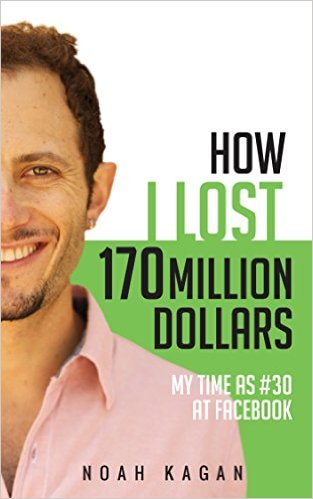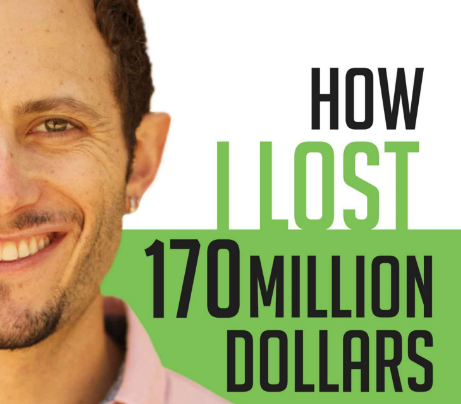I was introduced to Noah Kagan and his business, Appsumo from Tim Ferriss’ podcast. I ended up reading his book ‘How I Lost 170 Million Dollars: My Time as #30 at Facebook.’ I have to admit, it really shed a lot of light on the culture of Facebook, why it succeeded so quickly, and techniques that you can use to build a startup company.
 As someone who has tried to do multiple tech startups, I’m very familiar with the pressure, sense of urgency, and 100% commitment that a new company requires.
As someone who has tried to do multiple tech startups, I’m very familiar with the pressure, sense of urgency, and 100% commitment that a new company requires.
Since trying different tech startups, I transitioned into building a lifestyle business, which has led to much more happiness and ultimately, is a better fit with my personalty.
I still want to be involved with tech startups in the future, but this book reminded me of some of the personal and financial costs of being an early stage employee at a hot new startup.
In some ways, the tech startup industry mentality is very similar to the Wallstreet dream. It requires unbelievable dedication, a willingness to thrive in a competitive and emotionally turbulent environment, and the inner desire to continue to purse a dream that might turn out to be a mirage. At the end of the tunnel, you might not actually end up achieving what you wanted deep down inside.
With this review, I’m going to highlight a few of the major takeaways that I gained from reading this book. I highly recommend it if you’re a young entrepreneur with the dream to build the next Facebook, Twitter, or billion dollar unicorn.
Takeaway #1: Diversify your identity
So much of our happiness it tied to who we are (or think we are), our friends, and our sense of self-worth. When Kagan was fired from Facebook, he suffered a bit of an identity crisis, which led to a tremendous amount of unhappiness.
As a new entrepreneur, Kagan talked about how it’s important to do things outside of work to diversify your identity. You could have family, friends, hobbies, or goals, as long as they are not related to what you’re currently working on.
The reason is that should you have a hard day or fail at a goal, you won’t feel as worthless or like a complete waste of space. Instead, you’ll have other things that you can fall back on. If your sense of confidence or competency is tied to your work, then it can be easily shaken.
Takeaway #2: Your focus is everything in a startup
One of the common themes that I’ve picked up on between many of the top tech leaders like Steve Jobs, Elon Musk, and Mark Zuckerberg is their ridiculous attention to detail and focus. I think that their attention to detail is a byproduct of caring so much about their product.
With regards to focus, there is really only one metric that matters in a startup, and that’s growth. Growth in terms of new users and retention. Everything that Facebook did was judged in terms of whether or not it would help the site grow.
This focus and key metric made it much easier for Zuckerberg to say no to certain proposed features or cut features that didn’t seem right, even if they had been working on it for months.
The funny thing about growth is that often times, users don’t know what they want! This is why Facebook didn’t care what their users wanted, unless there was a high level of complaints over an extended duration. They “created the things we wanted, not what the users wanted.”
This level of focus also gave Zuckerberg some leeway when it came to treating his employees harshly. I think this is also true of Jobs and Musk. Since the “mission” of the company is more important than any one employee, the leader can use that as an excuse to treat employees like shit or make them devote their life to the company.
Takeaway #3: Having great employees is all that matters
Pretty much, the only thing that matters is having smart employees working at your company. In a tech startup, that means engineers who can build things. The company is literally relying on the output of these people and wants to have them do the best work of their lives.
The entire culture at Facebook was focused around getting employees to work more while they were there. This included amenities, free food, bonding parties, and a great office. Yes, it will make people want to stay around the office, but it’s also the classic reciprocity principle in action. It creates a feeling of obligation and loyalty on the part of the employees.
Not only were the engineers treated like Gods, but they were also required to be self-starters in some sense and autonomous. There are really some great tips in this ebook on structuring a high performing tech company.
Takeaway #4: The desire to be recognized can be fatal
Okay, this sounds a little melodramatic, but a lot of what Kagan was going through throughout this journey seems to be struggling with the desire to be recognized for his personal brand and to be validated by his intelligent co-workers.
I also struggle with these feelings and it’s interesting to see how the Ivy League environment affected his behavior. Personally, I’m not as affected by the Ivy League environment, but I do feel this way among other high-achieving entrepreneurs sometimes.
He comes to the conclusion that you should “Make great things and people will be curious about who made them.”
Conclusion
At the time of taking his job with Facebook, Noah was 24, the same age I am as I write this. He left a lot of money on the table as an early employee at both Facebook and Mint, but he certainly discovered a lot about himself and what he cares about. He now runs AppSumo.
In some ways, this book is a cautionary tail, but it also has a lot of practical advice for building a startup company. I highly recommend checking it out if you want to see what it’s really like inside of a billion dollar unicorn.
My biggest takeaway from this book is to be very conscious about which metric you’re targeting, be rigorous about your assessments of products or work that gets you towards that metric, and how you’re creating a culture that will help you maxmize that metric.
